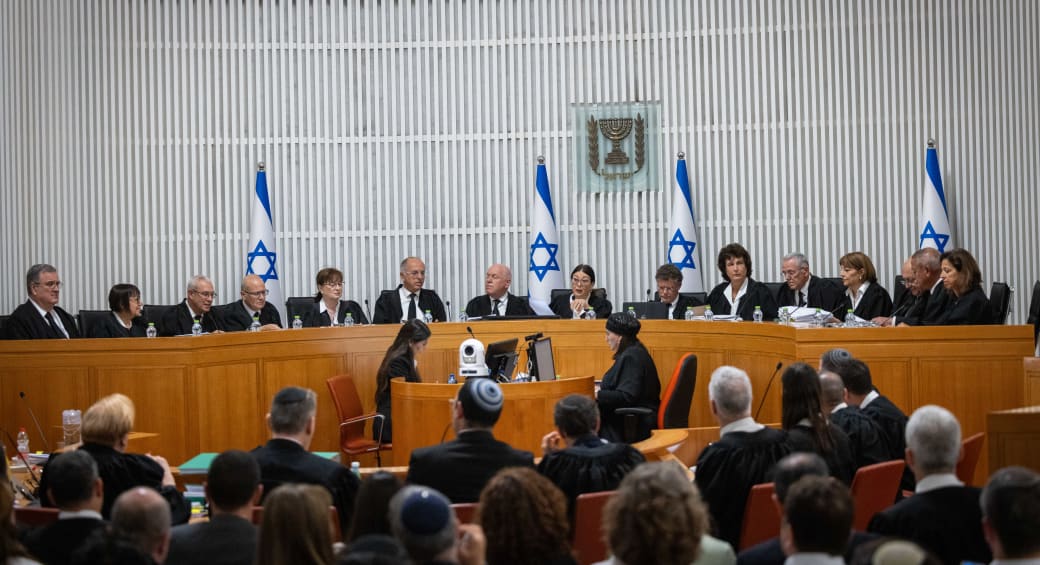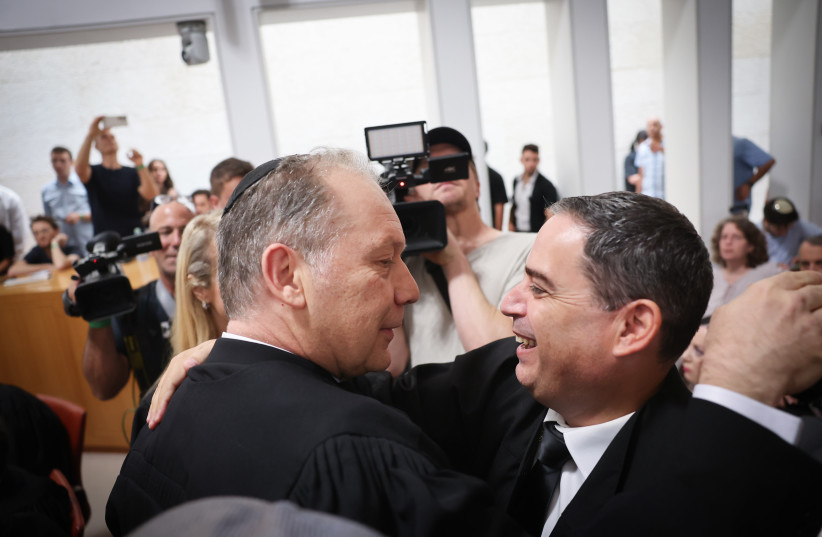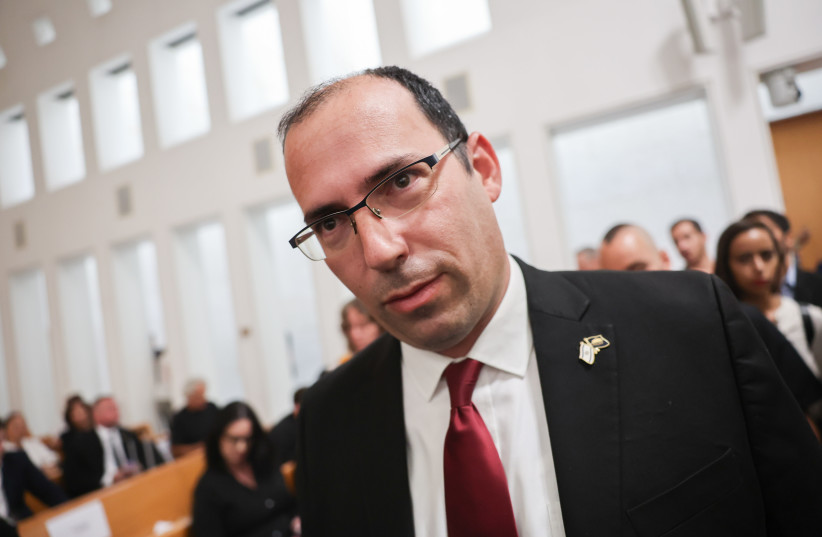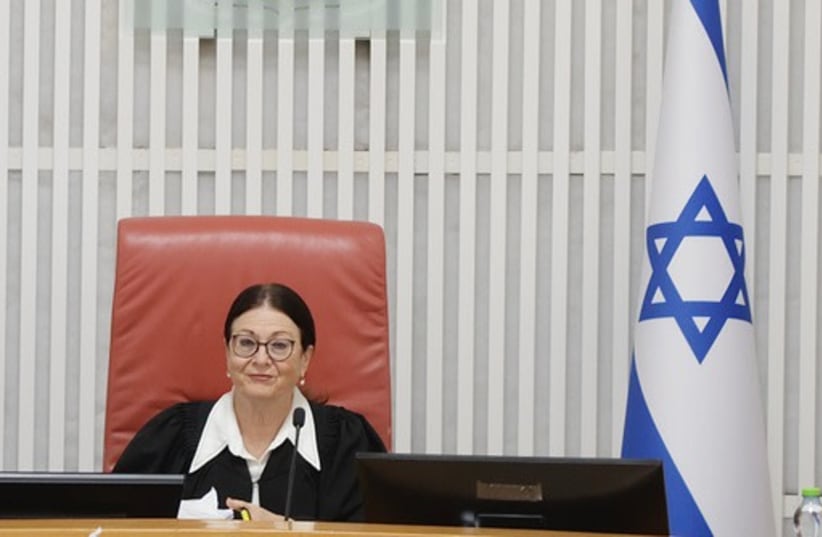Israel faces constitutional crisis in historic High Court hearing
High Court Justice Yitzhak Amit: Democracy dies in small steps • Full bench of 15 discusses amendment to Basic Law: The Judiciary

German envoy in Jerusalem: We are looking at High Court with interest
German Ambassador to Israel Steffan Seibert, observing the historic High Court hearing in Jerusalem on Monday, said that "friends of Israel are looking with a lot of interest toward the Supreme Court - and I wanted to see for myself."
The place to be this morning #בגץ pic.twitter.com/x7oVMPgsPg
— Steffen Seibert (@GerAmbTLV) September 12, 2023
"I think something important is happening here for Israel's democracy," Seibert added.
Knesset adviser: Focus of judicial reform law is 'very specific'
Knesset Legal Adviser Yitzhak Bert opened the day of arguments, rejecting contentions against the procedure of the amendment to Basic Law: The Judiciary, saying that there were several Constitution, Law, and Justice Committee hearings in which thousands of reservations were submitted, dozens of experts opined, and all the Knesset members knew what they were voting for.
"MKs had the full opportunity to have their opinions heard in the committee," said Bert.
High Court President Esther Hayut challenged Bert, saying that the process for all 26 Basic Laws was different than the reasonableness law.
Bert issued a defense of the constituent authority of the Knesset to introduce the quasi-constitutional Basic Laws, but said that the Knesset was not bound by the norms established in the Declaration of Independence. The declaration served to found the country but did not serve as a constitutional document.
Knesset legal adviser Yitzhak Bert said that the subject matter of the law was suitable for a Basic Law, since it was about the separation of powers and roles of each branch of government.
Interpretation to reduce the law is always preferable to the striking of a Basic Law, said Bert.
There is a difference between the requirement for officials to act reasonably, and the judicial ability of reasonableness, said Bert. The law also didn't cancel all review of judicial review or administrative review, noting that there could be other tools used like arbitrariness.
"I am saying that the focus of the law is very specific," said Bert.
Regarding the alleged unconstitutionality of the law, Bert said that the law passes the test established in the court's review of the Nation-State Law. The test holds that an unconstitutional law impacts the Jewish and democratic values of the state and, in an extreme situation, alters the state so that it is not democratic. The restriction of reasonableness doesn't impact democratic institutions like elections.
"Rule of law is not essential for a democratic state?" Justice Ofer Grosskopf asked.
Miri Regev: We must respect any High Court decision
Any High Court of Justice decision must be respected, Transportation Minister Miri Regev said on Monday, just as "parliament decisions must be respected by the court."
"Otherwise, we would be on the verge of chaos," Regev warned, calling on the 15 justices to "rise above all agendas and considerations, ignore the voices of anarchists."
IN PICTURES: Best snapshots from a historic hearing in Israel




ICYMI: Israeli ministers must commit to obeying the High Court - editorial

One of the front-page headlines in Monday’s edition of this newspaper was very problematic: “Only three gov’t ministers pledge to respect court ruling.”
The headline was problematic not because there was anything technically or grammatically wrong with it; the headline faithfully summed up the gist of the story.
Instead, the concern lies with the news itself: out of the 33 ministers comprising this coalition’s inflated government, only three would commit publicly to following the High Court of Justice’s decision – come what may – in the hearing that begins Tuesday on the law to limit the reasonableness standard.
Even in these unhinged times when red lines are regularly crossed – when a former Mossad head gives ammunition to every anti-Israel activist in the world by saying outrageously that Israel is enacting “apartheid” in the West Bank, and when a haredi (ultra-Orthodox) MK slanders Zionism and charges that Zionists thwarted efforts to rescue Jews during the Holocaust (a horrific falsehood) – it remains astounding that so few ministers are willing to declare their intention to abide by the court’s decision on this matter.
Even more dismaying is that Prime Minister Benjamin Netanyahu is not among those three.
Go to the full article >>WATCH LIVE: Israel's pivotal High Court hearing begins
A historic High Court of Justice hearing began on Tuesday morning when all 15 justices entered the courtroom all together for the first time to hear arguments to strike down the judicial reform's reasonableness standard law.
The hearing began at 9:00 a.m. local time and can be watched in full below:
The hearing is the culmination of a year of political and legal turmoil for Israel, in which the first and so far only judicial reform legislation to pass into law will be challenged.
The July 24 reasonableness standard law restricts a common law doctrine that allowed the court to engage in judicial review of government administrative decisions deemed far beyond what a reasonable and responsible authority would undertake. Under the law, the court can not review the administrative decisions or inaction of the government, ministers, and prime minister, but the standard still applies to civil servants.
The legislation was an amendment to Israel's quasi-constitutional basic laws. The court has never before struck down a basic law, and it is contested if it has the ability to do so. In recent weeks, opposition and coalition members have debated this legal question, raising concerns of a constitutional crisis.
Petitioners and respondents are set to continue in court the arguments about the legitimacy of striking down basic law amendments. The deliberations will center around a test of whether the Knesset abused its constituent authority to pass a politically-motivated law unsuitable for the norms of a constitutional article.
There are a total of eight petitions submitted by dozens of NGOs and activists. The government, Justice Minister Yariv Levin, and Prime Minister Benjamin Netanyahu are set to be represented by attorney Ilan Bombach, rather than the Attorney-General's Office -- a special exception for unique and sensitive situations in which the government client and mandated legal representation clash on their positions.
Pro-reform Israelis protest 'banana republic' ahead of historic hearing

The remnants of last night's protests remained outside on Tuesday morning, a reminder of the intense political and public scrutiny of the issue.
Crates of bananas were piled in one courtyard, a part of pro-reform demonstrations asserting that the judiciary is acting like a "banana republic" by hearing petitions on quasi-constitutional articles.
'Fatal blow to democracy': Yariv Levin launches scathing attack on High Court
"The court places itself above the government, above the Knesset, above the people and above the law," the justice minister charged.

The High Court judicial reform hearing amounts to an attack on democracy and the Knesset's status, Justice Minister Yariv Levin charged on Tuesday morning ahead of the pivotal hearing.
"The very discussions about the possibility of striking Basic Laws, which are the top of the legal pyramid in Israel, are a fatal injury to the majority's rule," the minister said.
"The court places itself above the government, above the Knesset, above the people and above the law. This is completely contrary to democracy."
Go to the full article >>POLL: Should Israel's High Court strike down or uphold judicial reform law?
Some 37% of the poll's respondents said that the High Court should dismiss the petitions as opposed to 34% who said it should strike down the law.

More Israelis believe the High Court of Justice should dismiss the petitions to strike down the law to limit the reasonableness clause than those who believe the courts should strike down the law, according to an Israeli Voice Index poll published by the Israeli Democracy Institute on Monday.
The poll was published a day before the High Court was due to hold a hearing on the amendment to Basic Law: Judiciary which much of the coalition said was damaging to Israeli democracy. In fact, only three ministers pledged to respect the High Court's ruling on the matter no matter what.
Some 37% of the poll's respondents said that the High Court should dismiss the petitions as opposed to 34% who said it should strike down the law. Amongst coalition and opposition voters, the opinions are almost entirely opposite with 61% of coalition voters believing the Court should dismiss the petitions while 61% of opposition voters believe it should strike down the law.
Levin must adhere to High Court on Judicial Selection Committee
Meanwhile, on the subject of the Judicial Selection Committee, more than half of Israelis believed that the High Court should be obeyed if it orders Justice Minister Yariv Levin to convene the committee.
Levin has refused to convene the committee until the suggested reform to it is passed, but this means that by the end of the year, Israel's courts will be in a shortage of judges. Next week, the High Court will hold a hearing on whether Levin must convene the hearing regardless of the reform.
Go to the full article >>What do you need to know about today's reasonableness court hearing?
The reasonableness standard law is the first and so far only judicial reform legislation to pass muster in the Knesset.

The High Court of Justice is set to hear eight petitions against the reasonableness standard law this morning, as part of the ongoing political and legal drama of 2023’s judicial reform.
The reasonableness standard is a common law doctrine that allows the courts to engage in judicial review of government administrative decisions deemed far beyond what a reasonable and responsible authority would undertake.
Critics of the doctrine have asserted that it is a highly subjective tool that allows for an activist court to interfere in policy and even government makeup, crossing the boundaries of different authorities and subverting the democratic will of the citizenry. Proponents of the standard contend that it is one of the few legal tools available to the court to check arbitrary and capricious government administrative decisions, and that it counters corruption by creating a requirement for officials to act reasonably.
Justice Minister Yariv Levin proposed the abolition of the reasonableness standard when he presented the judicial reform plan in January, but a bill was only introduced in June. The bill that passed into law on July 24 restricted the standard’s application to government, ministerial and prime ministerial administrative decisions, but did not protect civil servants.
The bill is the first and so far only judicial reform legislation to pass muster in the Knesset. As soon as it was passed into law, NGOs and activists fired off a series of High Court petitions calling for the law’s striking.
Go to the full article >>Israel's judicial reform
The High Court of Justice is set to hear eight petitions against the reasonableness standard law this morning, as part of the ongoing political and legal drama of 2023’s judicial reform.